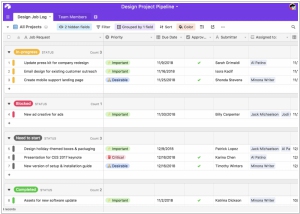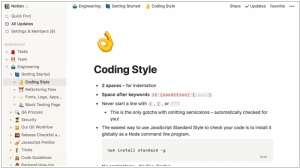Airtable vs Notion
August 23, 2023 | Author: Adam Levine
Airtable and Notion are both versatile productivity tools that offer unique features and functionalities to help users organize and collaborate on their work.
Airtable is a cloud-based relational database tool that combines the flexibility of spreadsheets with the power of databases. It allows users to create custom databases, tables, and views to manage various types of data. Airtable excels in its visual and user-friendly interface, making it easy to create and customize tables, add attachments, collaborate with team members, and integrate with other tools through its extensive range of app integrations.
Notion, on the other hand, is an all-in-one workspace that combines note-taking, document collaboration, and project management features. It provides a flexible and intuitive interface that allows users to create pages, databases, and task lists in a hierarchical structure. Notion stands out for its ability to handle both structured and unstructured content, making it suitable for personal note-taking, team collaboration, and project tracking. It also offers powerful features like nested pages, Kanban boards, and the ability to embed various types of content such as files, media, and databases.
See also: Top 10 Wiki software
Airtable is a cloud-based relational database tool that combines the flexibility of spreadsheets with the power of databases. It allows users to create custom databases, tables, and views to manage various types of data. Airtable excels in its visual and user-friendly interface, making it easy to create and customize tables, add attachments, collaborate with team members, and integrate with other tools through its extensive range of app integrations.
Notion, on the other hand, is an all-in-one workspace that combines note-taking, document collaboration, and project management features. It provides a flexible and intuitive interface that allows users to create pages, databases, and task lists in a hierarchical structure. Notion stands out for its ability to handle both structured and unstructured content, making it suitable for personal note-taking, team collaboration, and project tracking. It also offers powerful features like nested pages, Kanban boards, and the ability to embed various types of content such as files, media, and databases.
See also: Top 10 Wiki software
Airtable vs Notion in our news:
2024. Notion acquires privacy-focused productivity platform Skiff
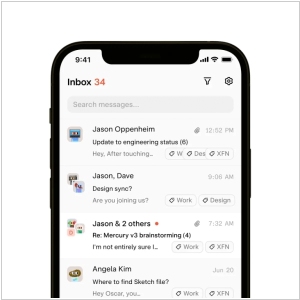
Notion has acquired Skiff, a platform established in 2020 by Andrew Milich and Jason Ginsberg, which specializes in providing end-to-end encrypted file storage, document management, calendar functionalities, and email services. Skiff initially garnered $14.2 million in funding and positioned itself as a secure alternative to Google Docs, expanding its offerings to include productivity solutions like calendars and emails. Skiff announced its integration with Notion on its website, along with the decision to discontinue its services after a transition period of six months. The company assured users that their Skiff accounts would not be automatically converted into Notion accounts but emphasized the ease of exporting or migrating data to other platforms.
2024. Notion launches a stand-alone calendar app
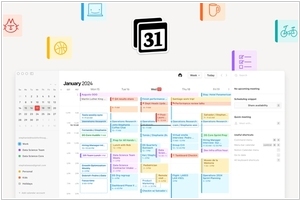
Notion, a widely used platform for note-taking and project management, has introduced a dedicated calendar service, drawing from its acquisition of the well-designed Cron calendar app in 2022. Positioned as a free next-generation iteration of Cron, Notion Calendar incorporates a built-in scheduling tool reminiscent of Calendly and offers optional deep integration with Notion. Accessible on Mac, Windows, iOS, and the web (with an Android app in development), the calendar seamlessly merges work and personal calendars, providing users with a unified view for effective day management. Although Notion has previously featured a calendar view within workspaces, it now integrates with external calendars, starting with Google Calendar. Emphasizing its standalone nature, users can opt for Notion Calendar as a standalone smart calendaring service, but for Notion users integrating it into their workflow, there's the added benefit of attaching Notion docs to calendar events, fostering better preparation and alignment within teams.
2021. Notion acquires India’s Automate.io in push to accelerate product expansion
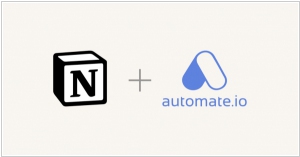
Workplace productivity startup Notion has recently acquired Automate.io, an Indian startup renowned for developing connectivity and integrations with more than 200 services. This acquisition serves as a strategic move for Notion to expedite its product expansion and enhance its appeal to the growing number of individuals and businesses transitioning to digital collaborative tools. With the addition of Automate.io, Notion gains valuable insights into the 200 integrations the Indian startup has built. This knowledge will enable Notion to empower users and enterprises by incorporating their workflows seamlessly into the Notion platform.
2020. Airtable raises $185M and launches new low-code and automation features
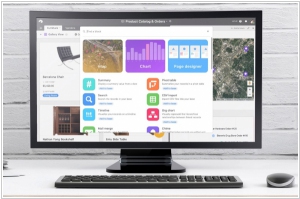
The no-code platform and spreadsheet-centric database, Airtable, has successfully raised $185 million in a Series D funding round. Alongside this milestone, the company is introducing new low-code features, automation capabilities (reminiscent of IFTTT for Airtable), and enhanced data management functionalities. While Airtable's pre-built blocks previously allowed users to incorporate maps, Gantt charts, and other features into their tables, there comes a point where the built-in functionality may not meet all user requirements, necessitating the need for custom tools (referred to as an "escape valve" by Liu, Airtable's CEO). To address this, Airtable has introduced Airtable Apps, enabling more advanced users to build additional functionality using JavaScript. Furthermore, users have the option to share their custom capabilities with others through the newly introduced Airtable Marketplace. These developments empower Airtable users to create more sophisticated and tailored solutions to meet their specific needs.
2020. Online workspace startup Notion raises $50M
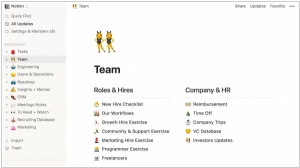
Online workspace startup Notion has secured $50 million in fresh funding, valuing the company at $2 billion. Established in 2016, Notion offers a comprehensive workspace solution encompassing note-taking, task management, wikis, and databases. Its unique proposition lies in consolidating various work applications into a single platform, making it ideal for efficient task and project management. Notably, amidst the global COVID-19 pandemic, Notion's remote work support played a significant role in attracting investors. The company experienced a surge in new customer sign-ups, setting new records, as remote working became the norm due to the pandemic. The exponential growth of remote work in 2020, spurred by COVID-19, has significantly bolstered the user base of remote work tool providers across different industries.

